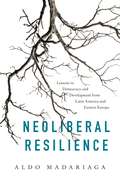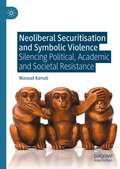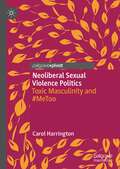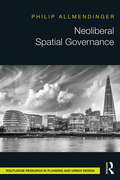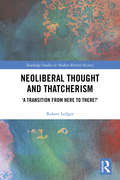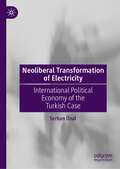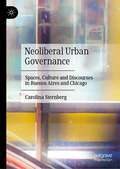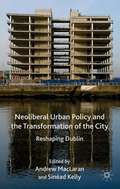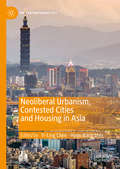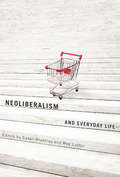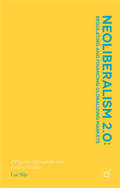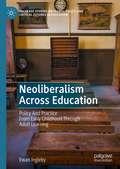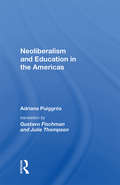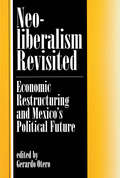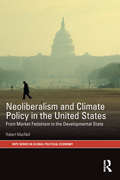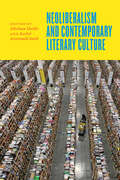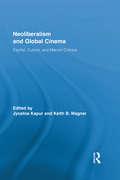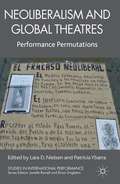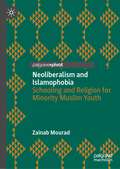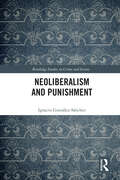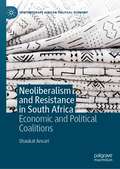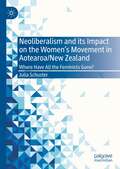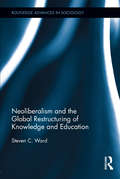- Table View
- List View
Neoliberal Resilience: Lessons in Democracy and Development from Latin America and Eastern Europe
by Aldo MadariagaAn exploration of the factors behind neoliberalism’s resilience in developing economies and what this could mean for democracy’s futureSince the 1980s, neoliberalism has withstood repeated economic shocks and financial crises to become the hegemonic economic policy worldwide. Why has neoliberalism remained so resilient? What is the relationship between this resiliency and the backsliding of Western democracy? Can democracy survive an increasingly authoritarian neoliberal capitalism? Neoliberal Resilience answers these questions by bringing the developing world’s recent history to the forefront of our thinking about democratic capitalism’s future.Looking at four decades of change in four countries once considered to be leading examples of effective neoliberal policy in Latin America and Eastern Europe—Argentina, Chile, Estonia, and Poland—Aldo Madariaga examines the domestic actors and institutions responsible for defending neoliberalism. Delving into neoliberalism’s political power, Madariaga demonstrates that it is strongest in countries where traditional democratic principles have been slowly and purposefully weakened. He identifies three mechanisms through which coalitions of political, institutional, and financial forces have propagated neoliberalism’s success: the privatization of state companies to create a supporting business class, the use of political institutions to block the representation of alternatives in congress, and the constitutionalization of key economic policies to shield them from partisan influence. Madariaga reflects on today’s most pressing issues, including the influence of increasing austerity measures and the rise of populism.A comparative exploration of political economics at the peripheries of global capitalism, Neoliberal Resilience investigates the tensions between neoliberalism’s longevity and democracy’s gradual decline.
Neoliberal Securitisation and Symbolic Violence: Silencing Political, Academic and Societal Resistance
by Masoud KamaliThis book explores the consequences of the last three decades’ substantial neoliberal securitisation of freedom of speech, democracy and social security of racialised groups. Its empirical material contains in-depth interviews with racialised politicians, journalists, academics and civil society activists in Sweden. Like many other countries, Sweden has combined a neoliberal reorganisation of society with securitisation policies in which ‘the war on terror’ has played a central role. In order to understand the complexity of neoliberal securitisation policies and the analysis of the empiric material, the study makes use of central theoretical concepts, such as ‘the spiral of silence’, ‘symbolic violence’, ‘governmentalisation’ and ‘neoliberal racism.’ It will be of particular interest to students and scholars of political sociology, social policy and social work.
Neoliberal Sexual Violence Politics: Toxic Masculinity and #MeToo
by Carol HarringtonThis book locates #MeToo’s traction among elites with “womenomics” theories that attribute feminized poverty, welfare dependency, and sexual violence to traditional femininity and toxic masculinity. Such neoliberal anti-sexual violence policies seek to empower women through paid work and reform men through fatherhood. This volume shows that men’s movements and conservative concerns about “fatherless families” developed toxic masculinity discourse before popular feminism incorporated it. It analyses how discourse on #MeToo issues in the workplace reveals a shift away from representations of women as traumatized victims in need of empowerment toward a focus on men as both problem and solution, setting new standards for masculine workplace conduct. However, this discourse reproduces a toxic/good men binary that serves to consolidate a new form of hegemonic masculinity. The book concludes that neoliberal sexual violence politics obscures how globalization fosters inequalities and sexual violence by blaming these and other social ills on toxically masculine men.This book will be of interest to scholars whose research focuses on sexual violence, feminist studies, masculinity studies, and neoliberalism.
Neoliberal Spatial Governance
by Phil AllmendingerNeoliberal Spatial Governance explores the changing nature of English town and city planning as it has slowly but clearly transformed. Once a system for regulating and balancing change in the built and natural environments in the public interest, planning now finds itself facilitating development and economic growth for narrow, sectional interests. Whilst there is a lip service towards traditional values, the progressive aims and inclusivity that provided planning’s legitimacy and broad support have now largely disappeared. The result is a growing backlash of distrust and discontent as planning has evolved into neoliberal spatial governance. The tragedy of this change is that at a time when planning has a critical role in tackling major issues such as housing affordability and climate change, it finds itself poorly resourced with low professional morale, lacking legitimacy and support from local communities, accused of bureaucracy and ‘red tape’ from businesses and ministers and subject to regular, disruptive reforms. Yet all is not lost. There is still demand and support for more comprehensive and progressive planning, one that is not purely driven by the needs of developers and investors. Resistance against the idea that planning exists to help roll out development, is growing. Neoliberal Spatial Governance explores the background and implications of the changes in planning under the governments of the past four decades and the ways we might think about halting and reversing this shift.
Neoliberal Thought and Thatcherism: ‘A Transition From Here to There?’ (Routledge Studies in Modern British History)
by Robert LedgerThe premiership of Margaret Thatcher has been portrayed as uniquely ideological in its pursuit of a more market-based economy. A body of literature has been built on how a sharp turn to the right by the Conservative Party during the 1980s - inspired by the likes of Milton Friedman and Friedrich Hayek - acted as one of the key stepping stones to the turbo-charged capitalism and globalization of our modern world. But how ‘neoliberal’ was Thatcherism? The link between ideas and the Thatcher government has frequently been over-generalized and under-specified. Existing accounts tend to characterize neoliberalism as a homogeneous, and often ill-defined, group of thinkers that exerted a broad influence over the Thatcher government. In particular, this study explores how Margaret Thatcher approached special interest groups, a core neoliberal concern. The results demonstrate a willingness to utilize the state, often in contradictory ways, to pursue apparently more market orientated policies. This book - through a combination of archival research, interviews and examination of neoliberal thought itself - defines the dominant strains of neoliberalism more clearly and explores their relationship with Thatcherism.
Neoliberal Transformation of Electricity: International Political Economy of the Turkish Case
by Serhan ÜnalThis book makes a structural analysis of the neoliberal restructuring in the global electricity industry. The book shows that the electricity liberalisation in different countries is just a reflection of the same structural trend in the global economy and avoids from both narrow country-specific and abstract global approaches by making a structural analysis completed by a case study. Thus, it aims reaching wider conclusions about how global changes in finance and ideology / knowledge structures influence domestic energy and economic policy preferences of developing countries. The book develops a taxonomy about organising principles around which the electricity industry has been structured historically and globally, and reveals drivers of change which influences the current energy transition in the electricity sector. Combining these aspects, the book uses financial and other economic data empirically, to shed light on the structural role of global transformation of the electricity markets on the domestic energy policy preferences of the developing countries. Thus, this work will be useful not only for academic purposes, but also for practitioners dealing with these issues.
Neoliberal Urban Governance: Spaces, Culture and Discourses in Buenos Aires and Chicago
by Carolina SternbergThis book examines the dynamics of neoliberal urban governance through a comparative analysis of Buenos Aires and Chicago, with a special focus on gentrification processes in both cities from 2011 to 2021. This work argues that neoliberal principles, rationales and institutions, along with the elaborate rhetoric that has contributed to their success, are forever present in the US and Latin American region, particularly in global cities like Buenos Aires and Chicago. The year of 2011 marks the (almost) simultaneous election of new executive authorities in each city, and finalizes in 2021—a sufficient time span to observe key patterns, narratives and developments of each neoliberal urban governance. First, this book chronicles the evolving urban neoliberal policies implemented since 2011 in both cities, with special attention to the systematic reduction of affordable housing and privatization of public land that have paved the way for gentrification to advance at a fast pace. Second, it also exposes readers to the prominent rhetoric crafted by local boards, developers, architects, and real estate agents in both cities. Third, this study chronicles how these contemporary neoliberal urban governances currently operate, a critical aspect that remains vastly unexplored. Lastly, until now these governances have been scantly explored from a comparative perspective in Latin American and North American urban settings, and so this book offers a rich new approach.
Neoliberal Urban Policy and the Transformation of the City
by Andrew Maclaran Sin�ad KellyThis collection focuses on the character and impacts of 'actually-existing' neoliberalism in Ireland, taking Dublin as a central case study. It explores the way in which Irish neoliberalism brought about a major transformation in the city and how the 'Celtic Tiger' economy underwent a dramatic change in fortunes, requiring a bail-out from the EU, ECB and IMF in late 2010. The study comprises four parts, setting the contextual background, examining the property-development boom and its legacy, reviewing the impacts of neoliberal urban policy in reshaping the city and, finally, noting aspects of public resistance to the operation of neoliberal urban policy, highlighting salient points to be drawn from the continuing Irish experience of neoliberalism and austerity. Drawing together a wide range of research, this volume is an essential read for undergraduates, postgraduates and academics in geography, sociology, urban planning and political science.
Neoliberal Urbanism, Contested Cities and Housing in Asia (The Contemporary City)
by Hyun Bang Shin Yi-Ling ChenConsidering Asian cities ranging from Taipei, Hong Kong and Bangkok to Hanoi, Nanjing and Seoul, this collection discusses the socio-political processes of how neoliberalization entwines with local political economies and legacies of ‘developmental’ or ‘socialist’ statism to produce urban contestations centered on housing. The book takes housing as a key entry point, given its prime position in the making of social and economic policies as well as the political legitimacy of Asian states. It examines urban policies related to housing in Asian economies in order to explore their continuing alterations and mutations, as they come into conflict and coalesce with neoliberal policies. In discussing the experience of each city, it takes into consideration the variegated relations between the state, the market and the society, and explores how the global pressure of neoliberalization has manifested in each country and has influenced the shaping of national housing questions.
Neoliberalism
by Meg Luxton Susan BraedleyIlluminating the ways in which neoliberal policies - such as the deregulation of economies and the transfer of governmental responsibilities to the private sector - have been implemented on a global scale, the contributors show how neoliberalism has seeped into our social and political fabric and affected our daily lives. Drawing attention to the most visible elements of neoliberalism in business, government, and personal life, reveal the ways in which policies designed to ensure market expansion also inevitably expand social inequalities of gender, race, class, and ability. Using a variety of methods, contributors discuss a range of topics, including globalization, privatization, health care, and the welfare state. An intelligent and informative collection that explains and challenges neoliberal policies, Neoliberalism and Everyday Life is an important assessment of a political system that makes profit easier and people's lives more difficult.
Neoliberalism 2.0: A Pigovian Approach for 21st Century Markets
by L. NijsIn today's increasingly globalized environment, many economic fundamentals need to be reconsidered in order to regain stability in the global marketplace. One such consideration is the failing dynamics of the international tax infrastructure. Neoliberalism 2.0 brings a 21st century assessment of the Pigovian taxes, considering a completely new calibration of the international tax systems, inspired by the historically developed Pigovian tax model. The book considers the impact neoliberalism had and will have on regulatory infrastructure, democracy in an era of globalization and reduced legitimation of the national state. The Pigovian model brings home the often forgotten relationship between taxation (as a part of the regulatory sphere), macro-economics, and the political-philosophical context in which law and economics emerge. The model also takes into account the phenomena of globalization and financialization and is tested using the financial sector as an example. This book addresses the many challenges a Pigovian shift would imply for the sovereign and its national economies. Neoliberalism 2.0 demonstrates the ability to design a paradigm-changing alternative to the current tax infrastructure, while taking into account a low economic growth environment of the future, the implications of globalization and the changing relationship between citizens and their state.
Neoliberalism Across Education: Policy And Practice From Early Childhood Through Adult Learning (Palgrave Studies on Global Policy and Critical Futures in Education)
by Ewan InglebyThis book explores the impact of neoliberalism on education in the UK. Drawing on policies across the sector in England as a case study, the author illuminates and analyses the development of neoliberal policy on models of practice. The author explores the theory and philosophy that have come to define neoliberalism, and offers an explanation as to how this has been applied to the education sector in England at various different stages. Informed and scaffolded by years of empirical research in educational contexts, this book interrogates the impact of neoliberalism on educational practice. It will be of interest and value to scholars of neoliberalism and education, as well as practitioners.
Neoliberalism And Education In The Americas
by Adriana PuiggrósThis book, a trenchant analysis of schooling within the capitalist world system, where educational reforms are directed to the satisfaction of the business community, military industrial complex, and corporate sector, is a work combating injustice and authoritarianism prevalent in the Americas.
Neoliberalism Revisited: Economic Restructuring And Mexico's Political Future
by Gerardo OteroHaving unilaterally opened its borders to international competition and foreign investment in the mid-1980s, Mexico has become one of the world's leading proponents of economic liberalization. Nevertheless, as the recent uprising of native peoples in Chiapas has made clear, economic reforms are not universally welcomed.This book addresses the challenges brought about by the restructuring of the Mexican economy at a time when multiple organizations of civil society are demanding a democratic political transition in a system that has been dominated by one party for nearly seventy years. The contributors identify the key social and political actors,both domestic and international,involved in promoting or resisting the new economic model and examine the role of the state in the restructuring process. They explore such questions as: In what ways is the state itself being reconstituted to accommodate the demand for change? How have Canada and the United States responded to the increased internationalization of their economies? What are the challenges and prospects for transnational grassroots networks and labour solidarity?Answers are provided by scholars from anthropology, economics, history, political science, and sociology, all of whom promote interdisciplinary approaches to the issues. Each chapter traces the structural transformations within the central social relationships in Mexican society during the last decade or so and anticipates future consequences of today's changes.
Neoliberalism and Climate Policy in the United States: From market fetishism to the developmental state (RIPE Series in Global Political Economy)
by Robert MacNeilThis book explores how Washington’s efforts to act on climate change have been translated under conditions of American neoliberalism, where the state struggles to find a stable and legitimate role in the economy, and where environmental and industrial policy are enormously contentious topics. This original work conceptualizes US climate policy first and foremost as a question of innovation policy, with capital accumulation and market domination as its main drivers. It argues that US climate policy must be understood in the context of Washington’s broader efforts over the past four decades to dominate and monopolize novel high-tech markets, and its use of immense amounts of state power to achieve this end. From this perspective, many elements of US climate politics that seem confusing or contradictory actually appear to have an obvious and consistent logic. This book will be of particular interest to students and scholars of IPE, as well as individuals generally interested in gaining a stronger understanding of US climate politics and policy, and the role and influence of neoliberalism on contemporary economic governance.
Neoliberalism and Contemporary Literary Culture
by Mitchum Huehls; Rachel Greenwald SmithHow has the pervasive spread of free market thinking affected contemporary literature?Neoliberalism has been a buzzword in literary studies for well over a decade, but its meaning remains ambiguous and its salience contentious. In Neoliberalism and Contemporary Literary Culture, Mitchum Huehls and Rachel Greenwald Smith offer a wide-ranging exploration of contemporary literature through the lens of neoliberalism’s economic, social, and cultural ascendance. Bringing together accessible and provocative essays from top literary scholars, this innovative collection examines neoliberalism’s influence on literary theory and methodology, literary form, literary representation, and literary institutions. A four-phase approach to the historical emergence of neoliberalism from the early 1970s to the present helps to clarify the complexity of the relationship between neoliberalism and literary culture. Layering that history over the diverse changes in a US-Anglo literary field that has moved away from postmodern forms and sensibilities, the book argues that many literary developments—including the return to realism, the rise of the memoir, the embrace of New Materialist theory, and the pursuit of aesthetic autonomy—make more coherent sense when viewed in light of neoliberalism’s ever-increasing expansion into the cultural sphere.The essays gathered here engage a diverse range of theorists, including Michel Foucault, Wendy Brown, Giorgio Agamben, Bruno Latour, Maurice Merleau-Ponty, Gary Becker, and Eve Sedgwick to address the reciprocal relationship between neoliberalism and conceptual fields such as biopolitics, affect, phenomenology, ecology, and new materialist ontology. These theoretical perspectives are complemented by innovative readings of contemporary works of literature by writers such as Jennifer Egan, Ben Lerner, Gillian Flynn, Teju Cole, Jonathan Franzen, Chimamanda Ngozi Adichie, Salvador Plascencia, E. L. James, Lisa Robertson, Kenneth Goldsmith, and many others. Neoliberalism and Contemporary Literary Culture is essential reading for anyone invested in the ever-changing state of literary culture.
Neoliberalism and English Language Education Policies in the Arabian Gulf (Routledge Research in Language Education)
by Osman Z. BarnawiOver the past two decades, the Arabian oil-rich Gulf countries have faced enormous social, political, economic, cultural, religious, ideological and epistemological upheaval. Through detailed, critical comparative investigation, Neoliberalism and English Language Education Policies in the Arabian Gulf examines the impact of such disruption on education policies in a political and economic union, consisting of six countries: Saudi Arabia, the United Arab Emirates, Oman, Qatar, Bahrain and Kuwait. Using data collected from a wide range of sources, this thought-provoking book documents the inner workings of neoliberalism across a strategic geographical area of the Islamic world. The book teases apart the complex issues surrounding the ways in which access to English has been envisioned, contested, and protected from being challenged among different players within and between the Gulf countries. Osman Z. Barnawi explores the intensifying ideological debates between Islamic culture and Western neoliberal values, and questions whether Islamic values and traditions have been successfully harmonised with neoliberal capitalist development strategies for nation building in the Arabian Gulf region. Neoliberalism and English Language Education Policies in the Arabian Gulf will be of interest to academics, researchers and postgraduates working in the fields of language education and, more specifically, TESOL, applied linguistics, education policy, and teacher education.
Neoliberalism and Everyday Life
by Meg Luxton Susan BraedleyIlluminating the ways in which neoliberal policies - such as the deregulation of economies and the transfer of governmental responsibilities to the private sector - have been implemented on a global scale, the contributors show how neoliberalism has seeped into our social and political fabric and affected our daily lives. Drawing attention to the most visible elements of neoliberalism in business, government, and personal life, reveal the ways in which policies designed to ensure market expansion also inevitably expand social inequalities of gender, race, class, and ability. Using a variety of methods, contributors discuss a range of topics, including globalization, privatization, health care, and the welfare state. An intelligent and informative collection that explains and challenges neoliberal policies, Neoliberalism and Everyday Life is an important assessment of a political system that makes profit easier and people's lives more difficult.
Neoliberalism and Global Cinema: Capital, Culture, and Marxist Critique (Routledge Advances in Film Studies)
by Keith B. Wagner Jyotsna KapurIn cinema studies today, rarely do we find a direct investigation into the culture of capitalism and how it has been refracted and fabricated in global cinema production under neoliberalism. However, the current economic crisis and the subsequent Wall Street bailout in 2008 have brought about a worldwide skepticism regarding the last four decades of economic restructuring and the culture that has accompanied it. In this edited volume, an international ensemble of scholars looks at neoliberalism, both as culture and political economy, in the various cinemas of the world. In essays encompassing the cinemas of Asia, Africa, Latin America, Europe, and the United States the authors outline how the culture and subjectivities engendered by neoliberalism have been variously performed, contested, and reinforced in these cinemas. The premise of this book is that the cultural and economic logic of neoliberalism, i.e., the radical financialization and market-driven calculations, of all facets of society are symptoms best understood by Marxist theory and its analysis of the central antagonisms and contradictions of capital. Taking a variety of approaches, ranging from political economy, ideological critique, the intersection of aesthetics and politics, social history and critical-cultural theory, this volume offers a fresh, broad-based Marxist analysis of contemporary film/media. Topics include: the global albeit antagonistic nature of neoliberal culture; the search for a new aesthetic and documentary language; the contestation between labor and capital in cultural producion; the political economy of hollywood, and questions of gender, sexuality, and the nation state in relation to neoliberalism.
Neoliberalism and Global Theatres
by Lara D. Nielsen Patricia YbarraHow do theatre and performance transmit and dispute ideologies of neoliberalism? The essays in this collection, now available in paperback for the first time, examine the mechanisms and rhetorics artists, communities, and institutions deploy to produce theatre and performance for global audiences. Neoliberalism and Global Theatres: Performance Permutations explores how the conditions of neoliberalism affect productions of theatre and performance globally, including case studies about New Zealand, Singapore, Vietnam, China, Peru, Mexico, Indonesia, Brazil, India, Nigeria, and the United States. The 18 essays by cutting-edge scholars reveal how performance circulates, transmutes and challenges the disciplinary formations and assumptions organizing contemporary investment in market logics, and, paradoxical notions of freedom. The book brings together diverse perspectives that challenge readers to grapple with the effects of globalized capital on theater, dance, film, visual art, televisual performance and music. Neoliberalism and Global Theatres: Performance Permutations provides an excellent introduction to neoliberalism for arts and humanities students studying performance in a global context.
Neoliberalism and Islamophobia: Schooling and Religion for Minority Muslim Youth
by Zainab MouradThis book explores the ways in which dynamics of Islamophobia and neoliberalism shape the schooling experiences of minority Muslim students in Sydney primary, public and independent schools. The author examines the issues at macro, meso and micro level. At the global systemic level, the book discusses the politics of naming Muslims and racialised governmentality within a capitalist neoliberal context. At the institutional level, it provides an insight into the Living Safe Together policy and explains how it can potentially provide space for teachers to abuse their authority or power in schools over minority Muslim students, within a wider discursive context shrouded by national security discourses, ‘homegrown’ terrorism and deradicalisation. Finally, at the individual level, drawing on the voices of teachers and Muslim students, the book highlights how Islamophobic discourse was reinforced through pedagogical practices, and how Muslim students resisted these discourses by speaking back to power.
Neoliberalism and Punishment (Routledge Studies in Crime and Society)
by Ignacio González-SánchezExploring the expansion of the penal system in Spain during the first 40 years of democracy, this book puts forward the importance of studying punishment from a sociological perspective and examines the neoliberal penality thesis.Today, Spain has more police officers and more people in prison than 50 years ago and a tougher penal code than that which existed at Franco’s death; however, crime has not increased for three decades, while most of the hardening of the penal system has occurred after its stabilisation. Studying the development of penality in Spanish democracy, this book explores Loïc Wacquant’s proposal that the expansion of the penal system should be understood as a characteristic of neoliberalism. It examines the parallel and reciprocal development of three policies in relation to the gradual implementation of neoliberal ideas and highlights how the evolution of the labour market, social policies, and the penal system are linked to one another and to neoliberal ideas related to the sacralisation of the utilitarian individual and the role of the state.Advocating for a sociological study of state punishment and contributing to a better understanding of the implementation of neoliberal policies, Neoliberalism and Punishment will be of great interest to students and scholars of criminology, sociology, and politics.
Neoliberalism and Resistance in South Africa: Economic and Political Coalitions (Contemporary African Political Economy)
by Shaukat AnsariThis book critically examines the persistence of market orthodoxy in post-apartheid South Africa and the civil society resistance such policies have generated over a twenty-five-year period. Each chapter unpacks the key political coalitions and economic dynamics, domestic as well as global, that have sustained neoliberalism in the country since the transition to liberal democracy in 1994. Chapter 1 analyzes the political economy of segregation and apartheid, as well as the factors that drove the democratic reform and the African National Congress’ (ANC) subsequent abandonment of redistribution in favor of neoliberal policies. Further chapters explore the causes and consequences of South Africa’s integration into the global financial markets, the limitations of the post-apartheid social welfare program, the massive labour strikes and protests that have erupted throughout the country, and the role of the IMF and World Bank in policymaking. The final chapters also examine the political and economic barriers thwarting the emergence of a viable post-apartheid developmental state, the implications of monopoly capital and foreign investment for democracy and development, and the phenomenon of state capture during the Jacob Zuma Presidency.
Neoliberalism and its Impact on the Women's Movement in Aotearoa/New Zealand: Where Have All the Feminists Gone?
by Julia SchusterThis book investigates how neoliberalism shaped the women’s movement in Aotearoa/New Zealand from the mid-1980s to late 2010s and looks at the future of the movement. Based on an empirical study that encompasses the three levels of the movement—individualised feminism, the work of women’s organisations, and state feminism—it explores how neoliberal rationality, promoted by governments over three decades, has impacted feminist identification and activism as well as political opportunities for organisations and institutions working within the movement. Exploring the diversity of feminist voices, the author analyses intersectional, (post)colonial and intergenerational debates within the movement in the context of neoliberalism’s influence on feminist values and strategies, and examines whether neoliberal rationality succeeded in depoliticising, individualising and fragmenting the movement. The book comes to the conclusion that despite some severe drawbacks, internal conflicts and changes of strategies, the women’s movement in Aotearoa/New Zealand has survived the impact of neoliberalism. This book will be of interest to scholars of Gender Studies, Sociology, Political Science, and Women’s History, as well as feminist activists.
Neoliberalism and the Global Restructuring of Knowledge and Education (Routledge Advances in Sociology)
by Steven C. WardThis book examines the influence of neoliberal ideas and practices on the way knowledge has been conceptualized, produced, and disseminated over the last few decades at different levels of public education and in various national contexts around the world.
